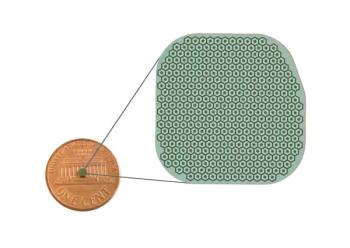
Morrow, Novacel Optical partner in preparation of eProgressive smart glasses launch
The European companies are collaborating in part of a strategic distribution partnership before the eProgressive smart glasses are available to the public later this year. The smart glasses use switchable lens technology to provide ease and comfort to patients needing progressive lenses.
Belgian-based vision technology firm Morrow and French lens manufacturer Novacel Optical have teamed up to take smart glasses to the next level.
The companies announced in a news release that they have entered a strategic distribution partnership for the launch of Morrow’s eProgressive smart glasses, which are designed to enhance vision with a switchable lens technology. The glasses will be available to consumers in the second quarter of the 2024 fiscal year.
“This collaboration exemplifies Novacel Optical’s consumer and optician-centric approach, dedicated to bringing the latest innovations to the eyewear market,” said Novacel Optical CEO Jenkiz Saillet.
Morrow’s eProgressive glasses work by mimicking natural eye accommodation with the push of a button. An electric current activates a liquid crystal lens in the glasses, which instantly changes light refraction. This allows the glasses to transition focus from near to far, and vice versa, eliminating the need for multiple pairs of progressive lenses. Instead of swapping between glasses, progressive wearers can transition from walking down the street to looking at their phone without taking their glasses off.
With the transition between vision focuses spanning a mere .6 seconds, eProgressive glasses provide a wider field of view, reduced side distortions, and improved depth perception and comfort. Morrow said this increase in comfort for its customers is indicative of the glasses’ Net Promoter Score of over 67, “signifying a high level of customer satisfaction.”1 Other benefits provided by eProgressive glasses include less aberrations, faster adaptation, no blurry bottom of lenses, an electronic boost for reading when near sight is turned on, and higher comfort.1
The company cites a popular dissatisfaction with bifocal and progressive lenses, with recent studies showing 26% of patients unsatisfied, and 13% struggling to adapt due to eye strain, reduced vision, and peripheral issues. Morrow details loss of peripheral vision, limited field of view for reading, poor ergonomics during screen work, and a higher risk of falling as the downsides to traditional progressive lenses.
The partnership allows Novacel Optical to gain exclusive access to Morrow’s technology for the French and Swiss markets, as Novacel is one of France’s main eyewear manufacturers.1
Ultimately, the collaborative goal of the companies is to provide improved vision and comfort for the over 30 million people with presbyopia in France and Switzerland, according to the news release.
“In a digital age, where everything evolves, glasses remained stuck in the past,” said Morrow CEO Paul Marchal. “This agreement is the culmination of 7 years of tireless work. We finally bring true innovation and better vision to the market.”
Smart glasses utilizing Augmented Reality (AR) technology have been cycling through both the consumer and industrial market for about a decade, with Google’s launch of Google Glass in 2013. Smart glasses have found more popularity in industrial use since their inception, as they work with the existing environment to superimpose information via the internet onto a field of vision. In embedded wireless glasses, this can be achieved via transparent heads-up display, see-through displays, or AR overlay.2
To learn more about eProgressive smart glasses, visit Morrow’s
References
- Morrow and Novacel Optical Partner to launch smart eProgressive glasses in France and Switzerland. Morrow. Press Release. Published January 15, 2024. Accessed January 16, 2024. https://morrow-nv.prowly.com/284143-morrow-and-novacel-optical-partner-to-launch-smart-eprogressive-glasses-in-france-and-switzerland
- Industrial augmented reality glasses: use case and applications. Acty. Updated 2023. Accessed January 16, 2024. https://www.acty.com/insight/industrial-smart-glasses-what-are-they-and-how-do-they-work/
Newsletter
Want more insights like this? Subscribe to Optometry Times and get clinical pearls and practice tips delivered straight to your inbox.



























